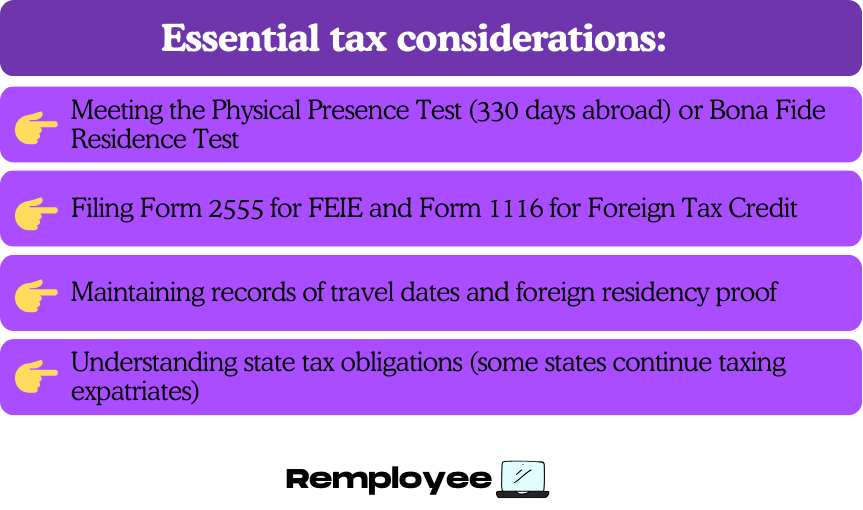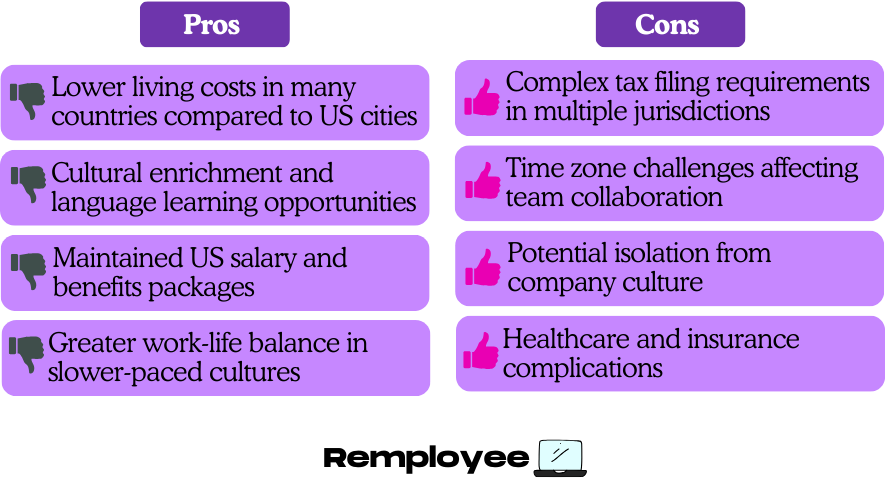Yes, you can work for a US company while living abroad without a US work visa, but you’ll need proper authorization in your country of residence. Remote work arrangements allow employees to maintain US employment from international locations, though specific requirements vary by destination.
Tax obligations, local visa regulations, and employment laws all factor into this arrangement. US citizens face different rules than foreign nationals, and each country has unique policies about remote workers. Understanding these legal frameworks ensures compliance while enjoying the flexibility of international remote work.
What Does It Mean to Work for a US Company While Living Abroad?
Working for a US company while living abroad means maintaining employment with an American employer while physically residing in another country. This arrangement typically involves remote work, where you perform your job duties online from your foreign location.
Your employer continues paying you through US payroll systems, and you remain subject to US employment laws and company policies.
Key aspects of this arrangement include:
- Maintaining your US employment contract and benefits
- Working across different time zones
- Following both US company policies and local regulations
- Managing international banking and payment logistics
Many professionals choose this path for lifestyle reasons, cost savings, or family circumstances. Technology companies, consulting firms, and creative agencies frequently support these arrangements.
Success requires clear communication with your employer, clarifying employer obligations, expectations, work hours, and deliverables while navigating the practical challenges of international remote work.
Do You Need a Work Visa to Work Remotely From Another Country?
You need a visa for your destination country, but typically a different type than traditional work visas. Most countries require tourist visas, digital nomad visas, or residence permits for remote workers employed by foreign companies.
The key distinction: you’re working for a US company, receiving US income, rather than entering the local job market.
Check specific embassy requirements before traveling. Many countries now offer specialized remote work visas recognizing the growing digital workforce. Avoid working on tourist visas where prohibited, as this risks deportation and future entry bans.
Tax Rules for US Citizens Working for a US Company Abroad

US citizens must file federal taxes regardless of where they live, but several provisions reduce double taxation.
The Foreign Earned Income Exclusion (FEIE) allows you to exclude up to $120,000 (2023 limit) from federal taxes if you meet specific residency tests. Additionally, the Foreign Tax Credit prevents paying taxes twice on the same income.
Essential tax considerations include:
- Meeting the Physical Presence Test (330 days abroad) or Bona Fide Residence Test
- Filing Form 2555 for FEIE and Form 1116 for Foreign Tax Credit
- Maintaining records of travel dates and foreign residency proof
- Understanding state tax obligations (some states continue taxing expatriates)
According to IRS data, over 760,000 Americans claimed the Foreign Earned Income Exclusion in 2021, saving billions in federal taxes. Consult a tax professional specializing in expatriate taxes to maximize benefits and ensure compliance with both US and foreign tax laws.
Can Non-US Citizens Work for a US Company From Overseas?
Non-US citizens can absolutely work for US companies from their home countries or third nations. This arrangement often simplifies visa complexities since you avoid US immigration requirements.
US companies hire international contractors or establish employer-of-record relationships to manage foreign employees legally. Your employment structure depends on your citizenship, residence country, and the company’s international presence.
Companies typically offer two main arrangements:
Consider local labor laws, social security agreements, and tax treaties between your country and the US. Many US companies now embrace global talent pools, making international employment more accessible than ever before.
Popular Countries to Live Abroad While Working for a US Employer
Several countries actively welcome remote workers through favorable visa programs, reliable infrastructure, and attractive living conditions. Mexico leads in popularity due to proximity to the US, affordable living costs, and minimal time zone differences.
Portugal’s Digital Nomad Visa and pathway to EU residency attracts long-term remote workers. Costa Rica offers stability, natural beauty, and strong expat communities.
Top destinations offer:
- High-speed internet and coworking spaces
- Reasonable cost of living compared to US cities
- English-speaking communities and international schools
- Quality healthcare systems
Dubai provides tax-free living and world-class amenities for high earners. Bali, Indonesia, combines tropical lifestyle with thriving digital nomad infrastructure.
European hubs like Berlin and Barcelona balance culture, connectivity, and career opportunities. Choose based on time zone compatibility with your team, visa accessibility, tax implications, and personal lifestyle preferences. Research specific neighborhoods within cities, as remote work quality varies significantly between areas.
Pros and Cons of Working for a US Company Without a Work Visa

Working for a US company from abroad offers significant lifestyle and financial advantages, though challenges exist. The flexibility to choose your living location while maintaining stable US employment creates unique opportunities for personal and professional growth.
Pros:
- Lower living costs in many countries compared to US cities
- Cultural enrichment and language learning opportunities
- Maintained US salary and benefits packages
- Greater work-life balance in slower-paced cultures
Cons:
- Complex tax filing requirements in multiple jurisdictions
- Time zone challenges affecting team collaboration
- Potential isolation from company culture and advancement opportunities
- Healthcare and insurance complications
Consider your career trajectory carefully. Remote international work suits independent contributors and senior professionals better than those seeking rapid promotion.
Some companies limit international remote work to specific durations or require periodic US visits. Evaluate personal factors like family obligations, social needs, and long-term residency goals before committing to this lifestyle.
Steps to Legally Work for a US Company and Live Abroad
Securing legal authorization to work remotely from abroad requires careful planning and documentation. Start preparations at least three months before your intended departure to allow for visa processing, tax planning, and employer negotiations.
Follow these essential steps:
- Obtain written approval from your employer for international remote work
- Research visa requirements for your destination country
- Apply for appropriate visa (digital nomad, temporary residence, or work permit)
- Register with local authorities upon arrival
- Set up international banking and payment methods
- Establish foreign health insurance coverage
Notify your US state of residence about your departure to avoid continued state tax obligations. Document your foreign residence with lease agreements, utility bills, and local registrations. Maintain detailed travel records for tax purposes.
Consult an international tax advisor to structure your finances optimally. Consider establishing a US address through mail forwarding services for banking and administrative needs. Schedule regular check-ins with your employer to maintain strong working relationships.
Wrap Up
Working for a US company while living abroad offers incredible freedom and opportunity when done legally. Proper visa selection, tax planning, and employer communication form the foundation of successful international remote work.
Each country presents unique requirements and benefits, so research thoroughly before choosing your destination. With careful preparation and ongoing compliance, you can enjoy the rewards of global living while maintaining your US career.
After years of freelancing through broken systems and vague job boards, Josie built Remployee to help others find what she couldn’t at first: flexible work that feels like freedom, not chaos. She believes real jobs should fit real lives—and that thoughtful writing can be a bridge to better work. If you’re looking for permission to choose differently, Josie’s already given it.



